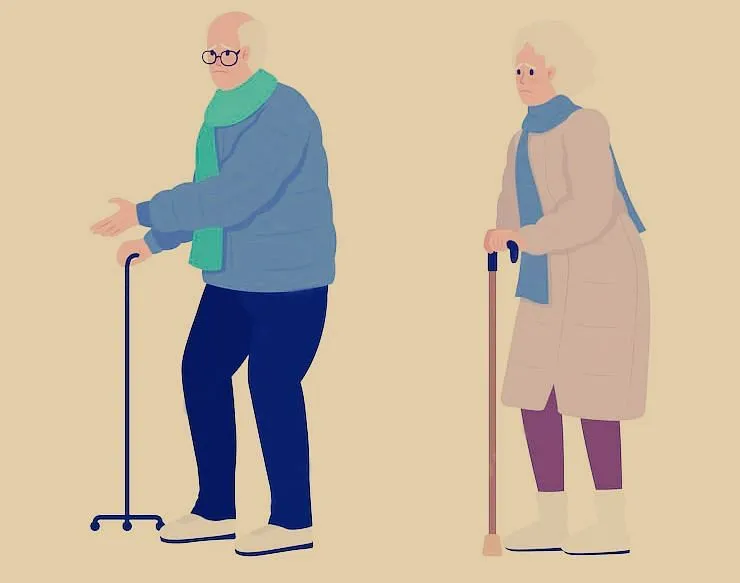In ancient Romania, old people were considered useless and were ordered to be killed. However, a young man saved his father and hid him in a cellar.
Years later, a terrible drought caused famine in the country, and the old man advised his son to plough the lane in front of their house.
Seeds from the crops dropped on the ground, and the lane yielded a bountiful harvest. The king was impressed and rewarded the old man for his wisdom.
From then on, the people of the country valued and respected their elders as a treasure for the nation, instead of considering them a burden.
Many cultures respect senior citizens for their wisdom and experience. Communicating with them enriches our personality and makes us wiser.
Their life stories are genuine and diverse. Counsellors document these stories without interpretation. Every senior citizen gives meaning to the happenings of their life. All stories, whether happy or sad, are meaningful. Senior citizens have lessons for the youth, but they are often not utilised.
Let’s share a story. One day, one of the authors of this article was driving from Nagbal to Srinagar and stopped at Gulab Bagh to buy some fruit. While on the road, he saw a senior citizen who was asking for a lift. Many cars passed by, leaving him unnoticed. It was a harsh winter day and the old man was shivering with cold. The author offered him a lift, and the old man asked to be dropped at Jamia Masjid. While driving, he shared his life story with the author, who then decided to make it a memorable day and visited various historical places in downtown Srinagar, guided by the senior citizen.
This elderly man grew nostalgic as they visited these places. He said, “I was born at Jamia Masjid, our ancestral graveyard is at Malik Sahib Gojwara, and my parents are buried here. It has been 30 years since we shifted to Zakura. I am a retired government teacher with four decades of service in the school education department. I retired as a zonal education officer. My childhood memories are etched here. I was a meritorious student of Islamia High School Rajouri Kadal.”
The senior citizen went on to recount the story of how the school was built, which he had heard from his father. At that time, there was not enough money to build the school. People kept earthen bins in their houses and put in a handful of rice every day. Shopkeepers kept collection boxes and asked every customer to donate an anna (a sixteenth part of a rupee). Every month, the rice and money were collected, and the rice was sold, and the proceeds kept for building the school. It was a time when the population lived in abject poverty, and building the school was a labour of love. The selfless teachers who served the institution from time to time were from both the majority and minority communities. These teachers not only imparted theory lessons but also inculcated the right attitudes, values, and ideals. The love and dedicated service rendered by the teachers still cling to the memory of its alumni.
It is regrettable that we have forgotten great personalities who contributed to our social lives, especially during difficult periods of our history. At the end, the senior citizen hugged the author and, with tears in his eyes, thanked them for investing time and giving moments of joy.
Great moments can catch us unaware, wrapped in seemingly insignificant things. Hearing a parent’s story can be as important to an adult child as it is to the senior citizen telling it. Abdul Gani Wani, 71, who lives in Srinagar, interviewed his father many years ago, using a tape recorder. He cherishes the story of his grandfather’s resourcefulness during a famine in Kashmir, when he peddled grocery items from his shop on a bicycle. It is a story about Mr. Ali Mohammad passing on to his sons. He regrets not collecting more stories from his parents and wants to ensure his sons don’t have similar regrets. He is now sharing his own life story vignettes.
Storytelling can also benefit terminally ill patients by addressing their need to feel life has purpose. One treatment is called Dignity Therapy, developed by Dr. Harvey Max Chochinov, a psychiatry professor at the University of Manitoba. A therapist asks patients about their accomplishments, experiences, and hopes for loved ones in a 20- to 50-minute audiotaped session.
Old age becomes the most difficult part of life’s journey, if taken alone. But if the journey continues with the ones for whom the elderly had sacrificed many things, the journey becomes more cherishable and rewarding. So it is our duty to make it as comfortable as possible for our parents. If a person is happy at heart, they always feel young. Keeping senior citizens well and cheerful is important for their well-being, and they should feel wanted, respected, loved, and cared for. Their guidance and blessings can be earned through our actions.
Dr Zubair Saleem is a Senior Geriatric Consultant and Gerontologist and Dr Showkat Rashid Wani is a Senior Coordinator, Directorate of Distance Education,University of Kashmir
Disclaimer: The views and opinions expressed in this article are the personal opinions of the author.
The facts, analysis, assumptions and perspective appearing in the article do not reflect the views of GK







